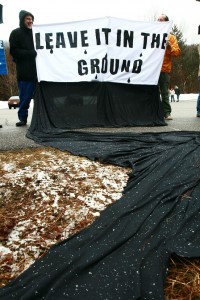In the lead up to the 7th Arctic Council meeting in Nuuk, Greenland May 12, the Council of Canadians co-ordinated an open letter sent by organizations to the Arctic Coastal State Foreign Ministers of Canada, U.S., Russia, Greenland, Denmark and Norway, demanding a moratorium on offshore drilling in the Arctic.
With the Arctic increasingly being seen as a final frontier for fossil fuel development, the open letter affirms international unity around concerns with, and opposition to, the pursuit of offshore drilling.
The Council of Canadians sees this as a first step in building global solidarity opposing Arctic offshore drilling.
The letter urges a moratorium on offshore drilling in Arctic waters and encourages the Arctic Council to advise against offshore drilling and engage in a discussion exploring alternative, viable opportunities for sustainable economic development.
The letter highlights the unacceptable risks of offshore drilling in Arctic waters and the need for political leaders to start choosing to leave fossil fuels ‘in the ground’ in the face of a climate crisis.
The signing organizations are: Avataq, Greenland, Friends of the Earth Denmark, Greenpeace Denmark, Friends of the Earth Norway, Greenpeace Norway, Kola Environmental Center, Russia, Council of Canadians, Canada, Greenpeace, Canada, Indigenous Environmental Network, Canada, Yukon Conservation Society, Canada, Alaska Inter-Tribal Council, U.S., Friends of the Earth U.S., Global Exchange, U.S., Indigenous Environmental Network, U.S., Pacific Environment, U.S., REDOIL Network, U.S.
You can read the open letter here.
You can read the press release here.
Here are some highlights from the open letter:
Leave it in the ground: On climate change and the Arctic
“The Arctic is already warming at a rate twice as fast as the rest of the world. Melting glaciers, sea ice and permafrost in the Arctic region is sending a clear warning signal that greenhouse gas emissions caused by dependence on fossil fuels has reached dangerous levels.”
“Leading climate scientists are reporting that the highest safe level of carbon dioxide in our atmosphere is 300 to 350 parts per million (PPM).The concentration of CO2 is now around 388 PPM and rising.”
“Scientific reports indicate that we can use less than half the proven economically recoverable oil, gas and coal reserves if we are to avoid two degrees of global warming — let alone, a more ambitious target. In other words, the severity of the climate crisis means we will have to leave identified fossil fuel deposits in the ground. Simultaneously, we need to move away from fossil‐fuel based economies through measures such as increased conservation, energy efficiency, renewable energy expansion, public transit and sustainable agriculture.”
On offshore drilling in the Arctic
“We are deeply concerned about the potential impacts of offshore drilling on fragile ice edge ecosystems upon which indigenous peoples and coastal communities rely for food security, economic, social and cultural needs.”
“Evidence demonstrates that best practices will not always be followed and accidents will happen. Arctic conditions such as freezing temperatures, reduced visibility, seasonal ice and extreme weather all increase the probability and consequences of a spill.”
“The United States National Academy of Sciences determined that ‘no current cleanup methods remove more than a small fraction of oil spilled in marine waters, especially in the presence of broken ice.'”
Andrea Harden-Donahue, Energy and Climate Justice Campaigner, Council of Canadians
www.canadians.org/arctic



